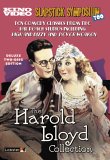| Reviews & Columns |
|
Reviews DVD TV on DVD Blu-ray 4K UHD International DVDs In Theaters Reviews by Studio Video Games Features Collector Series DVDs Easter Egg Database Interviews DVD Talk Radio Feature Articles Columns Anime Talk DVD Savant Horror DVDs The M.O.D. Squad Art House HD Talk Silent DVD
|
DVD Talk Forum |
|
|
| Resources |
|
DVD Price Search Customer Service #'s RCE Info Links |
|
Columns
|
|
|
Harold Lloyd Collection II
One of the greatest silent comedians was Harold Lloyd. He's known for the death defying stunts that provoked laughter in generations of film goers, but also for his 'glasses' character, an optimistic and enthusiastic young man who tackles live with vim. He didn't start out with this character though, it took him many years to develop the persona that would make him famous. He started out working for Hal Roach with a character named Willie Work, a tramp and obvious attempt to cash in on Chaplin's success. These films did very poorly; at one point Lloyd said that none of them were ever sold and distributed, and by 1928 no prints were still in existence.
After a brief stint with Mack Sennett at Keystone, Lloyd returned to Roach and together they created another Chaplin impersonation, Lonesome Luke. These were immensely popular and the distributor, Pathé, couldn't get enough of them. Lloyd didn't like the character however, since he wasn't original. After mulling some ideas over, he came up with what he called the "Glasses Character" a young ordinary looking man with glasses who uses his ingenuity to get out of scrapes. Roach and Pathé didn't want to make films with this new character since the Lonesome Luke films were doing so well, but Lloyd finally convinced Roach to give the character a shot, and by 1918, Lloyd had quit the Luke comedies and was only playing his glasses character.
Kino, in association with Lobster Films, has released a second set of Harold Lloyd shorts. (Be sure to read Stuart Galbraith IV's great review of the first volume here.) This time they've included 10 one-, two-, and three-reel comedies on a two DVD set. These include some of his best work including his first two three-reel films, Now or Never and Among Those Present and some of his classic thrill pictures including High and Dizzy and Never Weaken. This is an excellent set that has some outrageously funny shorts.
The films in this collection are:
Disc One:
Two Gun Gussie (1918): This one reeler has Harold playing piano in a bar in the old west. The Sheriff receives a letter from a neighboring lawman warning him about a tough characters who's headed his way. As luck would have it, the villain is in the bar and switches his picture, enclosed with the letter, with that of innocent Harold. The Sheriff and the rest of the town's people now think the mild mannered piano player is a tough hombre and quake at hsi every move, something that Harold plays up for all it's worth.
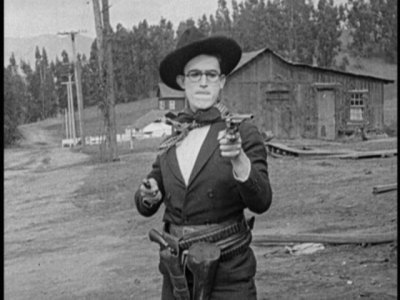 |
| |
This was a funny comedy that is severely hampered by the fact that many short sections, most lasting less than a second or two, are missing. This not only ruins the pacing and flow of the story, but you can't tell what some of the gags are, part of it is missing. You can still get a feel for what the film must have looked like, and I'm glad that they included it, but it isn't nearly as funny as it should be.
The City Slicker (1918): Another one-reeler, and this one is complete. Harold travels from the city to a rural hotel that has advertised for position. They want someone to modernize the hotel for them, and Harold gets the job. He soon installs many fancy push-button gadgets that are supposed to make the hotel appeal to refined folk: beds the slide into walls and bathtubs that hide in fireplaces. (I noticed he didn't install central heat.) This type of story has been done many times, Keaton would do something similar in The Electric House (1922), but it works well with Lloyd in the lead. There are some amusing gags, and while this is a fun short, it isn't a standout.
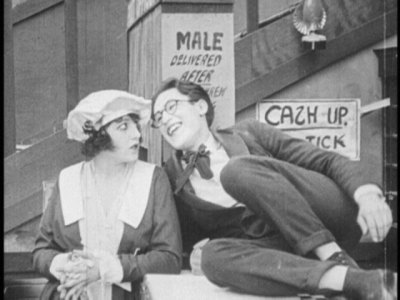 |
| |
The Non-Stop Kid (1918): All the bachelors in town are after Miss Wiggle (Bebe Daniels), but her father wants her to marry Prof. M. T. Noodle. Harold tries to win the beauty by impersonating the learned gentleman, with amusing results. This is an interesting early "glasses character" comedy. Only a year earlier, Lloyd was still making Lonesome Luck comedies. In this film he's come up with a lot of the traits that his character would become famous for, but not all of them. Harold is resourceful and optimistic, but he still isn't very far from his slapstick roots. There's a mean streak when he laughs at the other suitors being kicked out by Mr. Wiggle, and when he arranges to have a police officer hit Prof. Noodle over the head knocking him out. He's very close to the character that would make him a superstar though.
Ring up the Curtain (1919): Harold is the stage hand at a theater who falls in love with the leading lady of a traveling troupe. There are all sorts of mishaps backstage and an extended sequence with a snake that scares everyone witless. This is a minor Lloyd comedy. After coming so close to his glasses character in The Non-Stop Kid, here he reverts to average (at best) slapstick. His character isn't trying to better himself or rise up the ladder, he seems content sweeping up the stage. Even worse than that, this film doesn't have any of internal logic. Things just sort of happen, not for any specific reason, just because they might be funny. They usually aren't. The ending gag in particular was very against character and not very funny.
Captain Kidd's Kid (1920): The boy (Harold Lloyd) has lived life on the straight and narrow until the night of his bachelor party when he cuts loose; the one and only time in his life. As the movie opens, Harold's butler (Snub Pollard) is trying to wake him after the big shin-dig. The phone rings, and it's Harold's intended (Bebe Daniels): her mother heard about the huge party and the wedding is now off. The mother and daughter are going off to the Canary Islands for a vacation, and Harold pursues them. Booking a trip on an ocean liner, Harold manages to get thrown off the ship, followed by his faithful butler, and then captured by a ship load of female pirates!
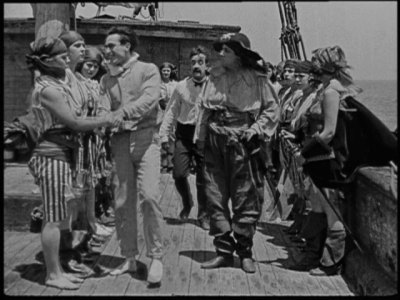 |
| |
This was Lloyd's second two-reel film and is a very enjoyable film. He really does well in the longer format. It starts off slowly with some fairly standard types of gags, but it picks up after the boy goes to sea. I loved the scene where Harold and Snub are in the ocean, hanging to a life preserver and they see the pirate ship coming. They hurriedly turn around and swin the other way trying to escape when one of the women stands up in the row boat and says "I think you are really mean to run away." When they find out they are being chased by attractive women, they change their minds quickly and swim back.
This was Bebe Daniels' last film with Lloyd. His long time leading lady and off screen sweetheart was moving up to feature films. Though they had talked of marriage, Harold wanted to concentrate on his career, and so they broke off their relationship, though they stayed friends for life.
From Hand to Mouth (1920): A girl (Mildred Davis) will inherit a fortune if she can prove her identity by midnight, if not, her half-brother gets the money. Her brother has hired a gang of crooks to kidnap her to make sure she doesn't collect. Meanwhile a boy (Harold Lloyd) is down on his luck and can't feed himself, much less the young orphan and her dog that attach themselves to Harold in the first reel. The boy gets offered some easy money to help kidnap the girl, but when he realizes what the group is planning on doing, he wants no part of it. The film ends in a race against time that foreshadows a lot of Lloyds feature films.
Made right after Captain Kidd's Kid, this movie features the first appearance of Mildred Davis in a Lloyd film. Davis would go on to be Harold's leading lady for the next four years until she married Lloyd and retired from the screen. They would remain married until his death 46 years later.
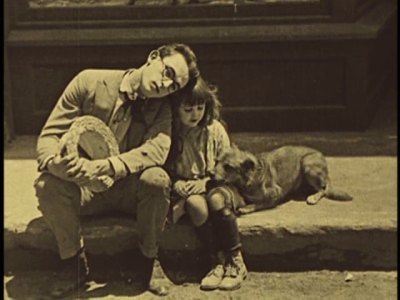 |
| |
This was Lloyd's most Chaplin-esque film, much more so then his Lonesome Luke films. He really tried to tug at the heart-strings in the first reel. It was very reminiscent of The Kid, a film that Charlie Chaplin would release two years later. That's only the begining however. After the first ten minutes, it was almost like Lloyd had a change of mind. The second half of the film doesn't feature the girl or her dog until the last shots, and is a straight slapstick comedy. A pretty funny comedy at that. I loved the scene where Harold gets the police to chase him so they can arrest the kidnappers. It was a gag he would reuse For Heaven's Sake to get the pool hall ruffians into church. It worked very well in both films.
You can really see the glasses character come to life in this film. He's honest, hard working, resourceful and very likeable. This is the character that would make Lloyd famous.
Disc Two:
High and Dizzy (1920): Harold's second 'thrill picture.' Lloyd plays a doctor who has to cure a patient (Mildred Davis) of sleepwalking. Before he goes over to see her though, he drops by a friend's house (Roy Brooks) who has just finished his latest batch of moonshine. They both sample a bit, then a bit more, and by the time Harold arrives at the girl's hotel, he's wildly inebriated. Of course she starts sleep walking, and walks out onto the window ledge, several stories up. Harold goes right after her and manages to get her back inside, where she promptly closes the window on him. Harold sobers up quickly when he realizes how high up he is, but he's still got to get off the side of the building.
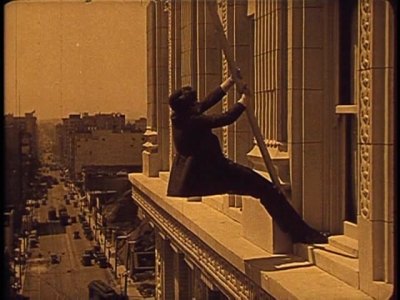 |
| |
This was a fun and exciting comedy. There were some good gags in the first section but the ending of the film where Harold is hanging off the side of a building was especially entertaining. Lloyd was remembered for his thrill pictures, and this one will give you a good idea why.
This also has the first credited appearance of Roy Brooks in a film. Roy was a good friend of Mildred Davis. After his film career failed to take off he became Harold's personal secretary and lived on Harold's estate for forty years until his death. Openly homosexual, Roy also served as a companion to Mildred while Harold was spending long hours filming.
Never Weaken (1921): One of Harold's greatest shorts. The object of Harold's affection, Mildred Davis, is the receptionist at a doctor's office. When Harold hears that she's been fired because of a lack of patients, he sets out to drum up some business for the doctor. He manages to fill the doctor's office, but then overhears Mildred talking to another man and falsely thinks she's in love with another. Not wanting to live without her, he tries to kill himself only to end up out on a girder stories above the ground.
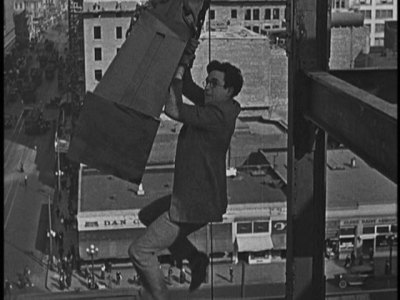 |
| |
This was really laugh-filled, a fantastic comedy. This picture has it all, some great comic gags, spectacular thrills, and a great ending. Harold has his glasses character down pat by now and really understood what would and wouldn't work in his comedies. One of the best, and a personal favorite.
Among Those Present (1921): In Harold Lloyd's second three-reel film (his first was Now or Never, also included in this set) he play a bell hop at a fancy hotel. A con-man convinces Harold to pretends to be Lord Algernon Abbott Aberdeen Abernathy, a newly arrived English aristocrat. Thinking it's all for a jest, Harold is introduced at a fancy party given my Mr. and Mrs. O'Brien where he regales the guests with (made-up) tales of his hunting and riding days in England. The next day, since he's such an accomplished rider, the pretend Lord is given Dynamite, the wildest horse in the stables to ride. The result is a hunt more exciting than any tale he's told.
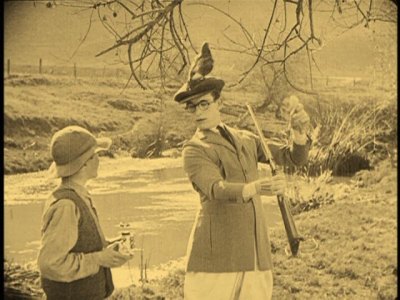 |
| |
This was another great comedy. The film is well constructed, and it doesn't drag or slow down, as some three-reelers do. The second half of the film where Harold has lost his pants and has to hide the fact from everyone he comes across is hilarious. The fox hunt was very thrilling and comic too, even better that the similar scene in Auntie Mame. It is easy to see how Harold was able to graduate to full length comedies soon after this.
Now or Never (1921): The Girl (Mildred Davis) is a nanny for a precocious little girl Dolly (Anna Mae Bilson). Mildred wants to go home for her 18th birthday because her boyfriend (Harold Lloyd) promised years ago that he'd marry her as soon as she came of age. She wants to see if he still remembers his promise. She hops on a train, and the little girl wants to come so badly that Mildred takes her too.
Harold does, and he's saved up money so that he can provide for his wife. A hobo steals his bankroll though and when he sees the crook climbing on the supports under a train car, Harold follows him. After a harrowing fight under a moving train, the money is lost and Harold climbs aboard where who does he find, but Mildred and Dolly. Unfortunately Harold doesn't have a ticket, and the child's parents are also on the train. Mildred leaves the young waif with Harold so she can explain the girl's presence, and Harold is left to dodge the train conductor and take care of a child at the same time.
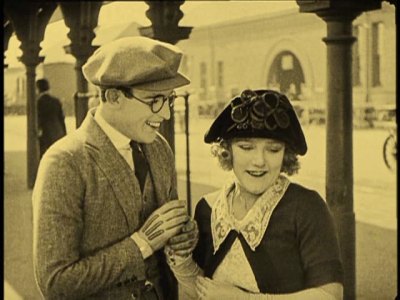 |
| |
This was a funny comedy, but not as good as Among Those Present. The film has a lot of good gags, but parts of it don't work as well as they could. The fight under the train for example. This wasn't as suspenseful as it could have been, and the whole scene had the look of being filmed on one of Roach's turning sets, which it probably was. Why Harold became so friendly with the crook who stole his money was never explained either. Even with these faults, there were some funny bits in the film. Anna Mae was very cute and did a good job for such a young actress.
The DVD:
Audio:
The audio track consisted of a piano score by Donald Sosin which sounded very good. Sosin's scores are always fun to listen to and this is no exception. The music he wrote was scene specific and generally added to the experience of watching the film. Never Weaken was especially helped by the audio track. They include a harp section when Harold thinks he's in heaven, and they also have a small combo playing jazz a few minutes later when one starts up in the film. Being recently recorded, there wasn't any audio defects. A very clean sounding track.
Video:
Like the previous three Slapstick Symposium releases, Lobster films has restored the image on these shorts and has done a very good job. The video quality was outstanding in general. There are some scratches and the occasional speck or two, and a very few scenes are a little faded and washed out, but these are only sections, and not the entire film. Once again I am impressed with the job that Lobster has done.
Extras:
Neither of these discs had any extras, but with so many great comedies, you really don't need any.
Final Thoughts:
These are some top-notch silent comedies. This set gives a good overview of the genesis of the glasses character. Over the course of these films Lloyd fine tuned the character and created one of the screen's most memorable comedy figures. Not only that, but these are genuinely funny. Lloyd's hanging off of girders in Never Weaken and his being captured by "girl pirates" in Captain Kidd's Kid are just some of the hilarious moments in this four hour set.
At long last the Harold Lloyd Trust has come to an agreement with New Line to release a very comprehensive collection of Lloyd films at the end of 2005. (See this installment of Silent DVD for more details including release date and a list of films to be included.) The Harold Lloyd Collection is going to have the last five of these films that appear in this collection also. The quality will probably be pretty good, if the print of For Heaven's Sake that the trust allowed to be shown at this years San Francisco Silent Film Festival is any indication. Even so, I think this is a collection worth buying. The music that Donald Sosin wrote and preformed is also very good and adds to the feeling of the films. There is also the fact that Kino and Lobster have done another fantastic job on this set of silent comedies, and that should be rewarded with your support. But most of all the first five films on this collection are entertaining, if not perfect, and they show the way the glasses character evolved in his early films. Altogether this is a very funny set of films that look very good. Highly Recommended.
|
| Popular Reviews |
| Sponsored Links |
|
|
| Sponsored Links |
|
|
| Release List | Reviews | Shop | Newsletter | Forum | DVD Giveaways | Blu-Ray | Advertise |
|
Copyright 2024 DVDTalk.com All Rights Reserved. Legal Info, Privacy Policy, Terms of Use,
Manage Preferences,
Your Privacy Choices | |||||||









